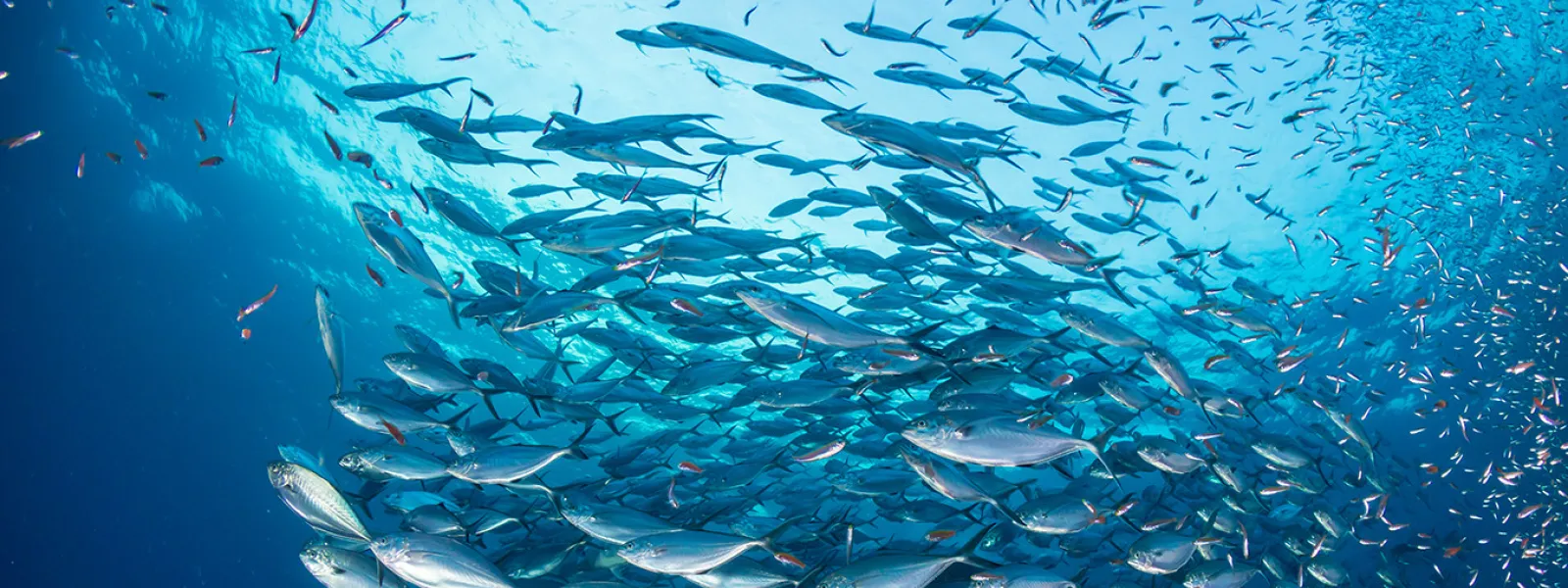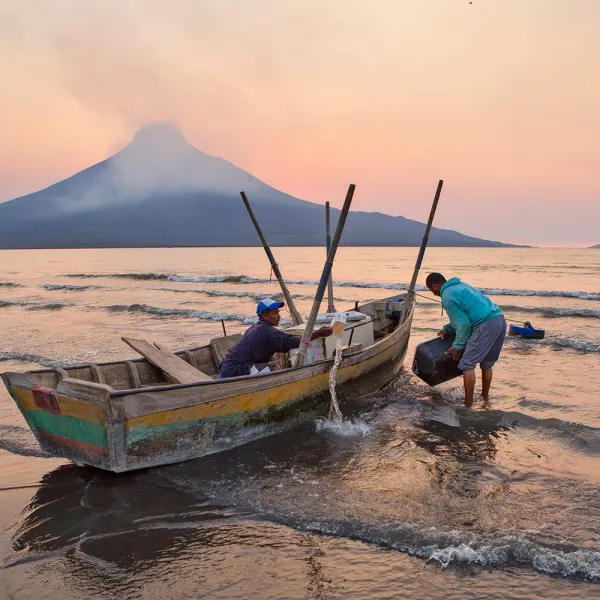
Project
ShutterstockTowards an end to subsidies that promote overfishing
Overfishing is one of the main problems for the health of our ocean. And the provision of negative subsidies to the fishing sector is one of the fundamental causes of overfishing.
Fishing subsidies are financial contributions, direct or indirect, that public entities grant to the industry.
Depending on their impacts, they can be beneficial when they promote the growth of fish stocks through conservation and fishery resource management tools. And they are considered negative or detrimental when they promote overfishing with support for, for example, increasing the catch capacity of a fishing fleet.
It is estimated that every year, governments spend approximately 22 billion dollars in negative subsidies to compensate costs for fuel, fishing gear and vessel improvements, among others.
Recent data show that, as a result of this support, 63% of fish stocks worldwide must be rebuilt and 34% are fished at "biologically unsustainable" levels.
Although negotiations on fisheries subsidies, within the framework of the World Trade Organization, officially began in 2001, it was not until the 2017 WTO Ministerial Conference that countries committed to taking action to reach an agreement.
This finally happened in June 2022, when member countries of the World Trade Organization reached, after more than two decades, a binding agreement to curb some harmful fisheries subsidies. It represents a fundamental step toward achieving the effective management of our fisheries resources, as well as toward ensuring global food security and the livelihoods of coastal communities.
The agreement reached at the 12th WTO Ministerial Conference provides for the creation of a global framework to reduce subsidies for illegal, unreported and unregulated fishing; subsidies for fishing overexploited stocks; and subsidies for vessels fishing on the unregulated high seas. It also includes measures aimed at greater transparency and accountability in the way governments support their fisheries sector.
The countries agreed to continue negotiating rules to curb other harmful subsidies, such as those that promote fishing in other countries' waters, overfishing and the overcapacity of a fleet to catch more fish than is sustainable.
If we want to have abundant and healthy fishery resources, it is time to change the way we have conceived fishing until now. We must focus our efforts on creating models of fishery use that allow for long-term conservation.
Partners:


The Protection of Coral Reefs in Mexico (in Spanish)
This report outlines the importance of coral reefs in the world—in Mexico in particular—and explores case studies, outlines relevant international treaties and obligations, and looks to best practices from nations around the region for inspiration. Download the report (in Spanish)
Read moreOrganizations alert World Bank to risks of Colombian mining investment
Delegation explains to the International Finance Corporation (IFC), a branch of the World Bank Group, illegalities and possible harms to people and the environment from Eco Oro Mineral’s Angostura mine in Santurbán, Colombia. Washington/Ottawa/Bogota/Bucaramanga. From September 11-13th, representatives from the Committee for the Defense of the Water and Páramo of Santurbán, a local coalition in the area affected by the mine, met with officials of the World Bank and the International Finance Corporation (IFC), to alert them to illegalities and socio-environmental risks associated with the Angostura mine project in Colombia, in which the IFC invested four years ago. The Committee was accompanied by representatives from the Interamerican Association for Environmental Defense (AIDA), the Center for International Environmental Law (CIEL), the Centre for Research on Multinational Corporations (SOMO), and MiningWatch Canada. IFC bought shares in Eco Oro Minerals, which hopes to open a large scale gold mine in the Santurbán páramo, a source of fresh water for millions of Colombians, habitat for endemic and threatened species, and important for climate change mitigation through the capture of atmospheric carbon. The delegation emphasized that mining puts all of this at risk and as such, according to Colombian legislation and international norms, is prohibited in páramo ecosystems. They added that cumulative effects should have been considered because the Angostura project has stimulated interest in a possible mining district in the area, in which extensive areas have been concessioned to various mining companies and that has also been affected by the armed conflict. In 2012, the Committee, with support from its allies, presented a complaint to IFC’s accountability mechanism, the Compliance Advisor Ombudsman (CAO). As a result, the CAO opened an investigation to determine whether the IFC adequately evaluated the social and environmental risks associated with this project before making its investment. The results of the investigation will likely be published before the end of the year. "We hope that, as a result of the CAO report, IFC will withdraw its investment from this mining project, since there is no way that Angostura can live up to the World Bank policies," remarked Erwing Rodríguez, a member of the Committee. "This is a very important case in Santander and the whole country. Through thousands-strong marches and many other actions in defense of water, páramos and territory, we have made it clear that we do not support large-scale mining in the Santurbán páramo," stated Miguel Ramos, another Committee member. A lawyer for AIDA, Carlos Lozano Acosta, continued: "This is a key case because it will set a precedent in the region with regard to the protection of páramos, which are vital for the provision of water and in the fight against climate change." "The World Bank is taking on an unnecessary and unprofitable risk. The value of the shares in Eco Oro that the IFC purchased has considerably dropped. This project is not good for the páramo, for Colombians, or for the IFC. We don’t understand why the IFC insists on maintaining this investment," concluded Kris Genovese of SOMO.
Read moreTri-national organization to investigate Mexico for environmental enforcement in Gulf of California development
The Secretariat of the Commission for Environmental Cooperation (CEC) recommended a thorough investigation of Mexico’s systemic failure to enforce its environmental law when authorizing the construction of tourism resorts in the Gulf of California, Mexico. The Gulf region contains many vulnerable ecosystems, endangered species. Mexico City, Mexico. The Secretariat of the Commission for Environmental Cooperation (CEC) — an intergovernmental organization created under the North American Free Trade Agreement (NAFTA) between Canada, Mexico and the U.S. — has recommended a thorough investigation of Mexico’s systemic failure to enforce its environmental law when authorizing the construction of mega tourism resorts in an important area of the Gulf of California. This investigation comes in response to a citizen petition submitted by the Interamerican Association for Environmental Defense (AIDA) and its partner organization Earthjustice on behalf of 11 local and international organizations. The petition uses the permitting of four mega resorts in this vulnerable region to demonstrate how environmental violations are prevalent. The Gulf of California is a vast area—comprised of the States of Sonora, Sinaloa, Nayarit, Baja California and Southern Baja California. The area contains sensitive ecosystems such as coral reefs and coastal mangroves, and is home to endangered species (whales, manta rays, sharks and turtles, among others), migratory birds, and traditional fishing communities. The latter depend on the local tuna, sardine, shrimp and squid fisheries, which provide employment for nearly 50,000 people. Yet, the Mexican government authorized the construction of three mega resorts in that area—Paraíso del Mar, Entre Mares, and Playa Espíritu—without complying with laws related to environmental impact assessment, endangered species protection, and coastal ecosystem conservation. With these projects, the natural environment in the Gulf of California, and the wildlife and human communities that depend on it, have been put at risk. The CEC Secretariat based its recommendation to conduct a detailed investigation and prepare a "factual record" on the lack of appropriate environmental impact assessments for the projects. The decision does not include Cabo Cortés project, because this project’s environmental permit was recently revoked. "Projects like Playa Espíritu, located in Marismas Nacionales [one of Mexico’s largest wetlands and a key mangrove forest], impact small local companies and the fishing sector. Fisheries are harmed when the mangroves are damaged because these wetlands are a critical nursery and reproductive site for fish," said Carlos Simental of the Ecological Network for the Development of Escuinapa (Red Ecologista por el Desarrollo de Escuinapa - REDES), one of the petitioners. The Gulf of California and its rich biodiversity face a serious problem. Among many examples and according to recent studies, the brown pelicans in the area are not reproducing as they used to, likely due to climatic changes and lack of food due to overfishing. Tourism development that is poorly planned and fails to comply with the laws aggravates the situation. "We hope the Mexican government will receive feedback on how it makes decisions related to environmental impact assessments for tourism development in the region", said Sandra Moguel, an AIDA attorney. "With the preparation of this factual record, we are seeking improvements in the environmental impact assessment process on various fronts. These include the consideration of cumulative impacts—both from separate projects and from all components that comprise any single development—as well as the use of best available information, and inclusion of effective measures for protecting endangered species and mangroves, as required by Mexican law and treaties that Mexico has ratified." The investigation of what has happened in the Gulf of California could yield positive outcomes such as legal reforms, dialogue to improve environmental impact assessment processes, and the design of sustainable tourism projects that involve local communities from the outset. The Council of the CEC, a panel of high-ranking environmental officials from Canada, the United States and Mexico, will decide within two months whether or not they accept the recommendation to develop a factual record. "The Secretariat’s recommendation points to a serious concern that Mexico is failing to effectively enforce environmental laws in the Gulf of California," said Martin Wagner, Director of the International Program of Earthjustice. "This environmental treasure is home to incredible marine biodiversity; it is a critical source of protein for the Mexican people and needs long-term protection. No mega-resort, most of which stem from foreign investment, should be exempt from complying with Mexican environmental protections."
Read more